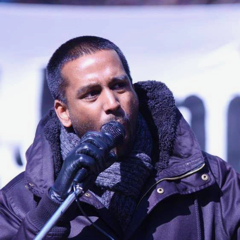
Krisna Saravanamuttu
Law students wear many hats, and at Osgoode, many students also wear the hat of being community organizers. I had the honour of interviewing 12 JD students about their involvement in various social justice movements and community initiatives this past year. Here is an overview of their work.
Krisna Saravanamuttu (3L) is a dedicated social activist who has for many years been involved in workers’ rights, environmental justice, human rights, and anti-war movements. Prior to entering law school, he served as a community organizer for about 15 years, and it was his experience of working in social movements that informed his decision to pursue a legal education.
Krisna highlighted the Wet’suwet’en solidarity work in which he’s been involved over the past year. A lot of that work, he explained, has been “working alongside people across the country to organize peaceful civil disobedience to support the Wet’suwet’en Nation. We support their demand for an immediate withdrawal of the RCMP from their lands and a halt to the construction of the TC energy pipeline based on the principles of Free, Prior and Informed Consent.” In the last three months, Krisna’s activism has focused on direct action at blockades or rallies, but he has also been reporting from the frontlines and writing analytical pieces about the Wet’suwet’en struggle for Spring Magazine.
Krisna’s motivation to engage in Wet’suwet’en solidarity work is deeply connected to his identity as a Tamil person. He said, “we have our own freedom struggle in Sri Lanka, and we were forced to flee our homeland and become refugees because of genocide. But it’s important to resist a narrative about the generosity of the West because those narratives erase the culpability of those same countries in creating the conditions that coerce mass displacement in the first place. In Canada, settler-colonialism has attempted to extinguish Indigenous peoples for hundreds of years. As refugees, we have a duty to support their resistance, and build a true nation-to-nation relationship based on Indigenous sovereignty and self-determination.”
Krisna offered thoughtful reflections about the value of community organizing. “Legal and political changes happen because of the hard work that people do in their communities by working together.” With respect to his involvement in policy changes at the federal, provincial, and municipal levels of governments, he noted that “these changes are often a direct response to the pressure created through community organizing.”
When asked about the value of law, his response was humbling: “practicing law is not the be-all or end-all, it’s just a tactic. What always needs to take primacy is our organizing work on the streets – that’s what leads to real transformative change. Movement lawyering is important too and litigation can be a useful tactic. But when lawyering is unhelpful, we shouldn’t be limited by it.”
“It’s been quite useful to get a legal education because it deepens my understanding of how legal and political systems work,” Krisna acknowledged, “but it’s also bolstered my fundamental belief that we have to prioritize strategies and tactics outside the legal profession that empower ordinary people and movements.”
“In a lot of ways, our activism broadens our political and legal imaginations. If we only studied some of the most pressing problems of our time through the lens of the law, then there’s only a narrow set of possibilities available to us. But the minute we centre community organizing we begin to empower one another to actually build a different world.”
